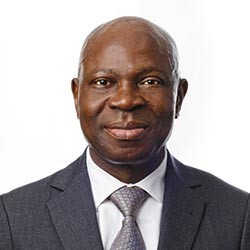G7 Ministerial Conference, United for Global Food Security - Statement by Gilbert F. Houngbo, President of IFAD
IFAD Asset Request Portlet
Publicador de contenidos
G7 Ministerial Conference, United for Global Food Security - Statement by Gilbert F. Houngbo, President of IFAD
Lugar: Berlin
24 junio 2022Check against delivery
We are all aware of the tragedy unfolding in the Ukraine, and its implications for global food security.
From the perspective of those of us working daily to eliminate extreme poverty and hunger, this is one more blow to the world’s most vulnerable people.
Climate change, conflicts, economic slowdowns and the pandemic are threatening to undo decades of development gains and push millions deeper into hunger.
Even before the war in Ukraine, there was an estimated shortfall of over US$300 billion annually, to transform food systems to deliver healthy lives, a healthy planet, and healthy economies. Even before the war, between 720 and 811 million people went to bed hungry every night. We are very far from reaching zero hunger by 2030.
I am very concerned about the looming food crisis in the world, and particularly in Africa. We must act now. Not only with a humanitarian response, but equally urgently, with investment in medium and long-term sustainability.
Even as we speak today, a country like Ghana is facing a fertilizer gap of more than 500,000 tons for the next planting season.
Let’s remember that Africa is already the region with the lowest use of fertilizers (20 kilograms/hectare in Sub-Saharan Africa versus 170 kg/ha in South Asia and 158 kg/ha in Europe).
As a member of the G7’s Global Alliance for Food Security, IFAD stands ready to coordinate efforts to boost sustainable agricultural production for upcoming harvests (GAFS’s Pillar 3) – and to actively engage in the other pillars.
Let me highlight four critical points:
First, extreme poverty and hunger are disproportionately located in the rural areas of developing countries. In many of these countries, 60-70% of the population live in rural areas. We cannot have global food security without small-scale producers – including women, indigenous peoples and youth.
Small-scale farmers produce one-third of our food. They must be connected to markets and paid fairly.
We must quickly scale up investment in production, local transformation, storage, and access to markets. Training and capacity building is also key.
Secondly, we shall galvanize investments in rural small and medium enterprises working in agribusiness. They are at the center of the economy of their countries. They have a very high potential for growth and for creating and preserving jobs – especially for the youth.
Thirdly, we must ensure poor rural producers have access to technology. For example, solar powered water pumps are critical during droughts; remote sensors can tell farmers how much fertilizer their crops need. Access to technology is also essential to cut food loss and waste and improve food security along the chain.
And fourth, we must cooperate, coordinate, and commit to investing in food systems that are sustainable and resilient -- inclusive and fair.
Our meeting today is an encouraging step in that direction.We look forward to working with all of you in a unified response at the global and local levels.
